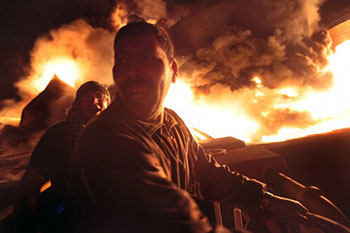Two years after the fall of the ” Gaddafi regime”, Libya is on the verge of breaking up – the sad outcome of the West-backed “Arab spring”. Rival militia groups and tribes are waging local mini-wars on each other, oil production has plummeted to its all-time lows and food shortages are threatening Libyans with starvation.
In the worst-case scenario, the entire Middle East and North Africa might plunge into instability. The West has failed to come up with anti-split recipes for Libya. Instead, it ducked and covered. No one has been called to account for having turned the once-prospering North African state into a hotbed of perpetual civil war.
De facto, Libya is being ruled by numerous armed militias craving for control over oil-rich areas. The ethnic origin and religious beliefs of militia fighters are largely irrelevant as this is a fight for resources, for money, actually for physical survival. Libya has the largest oil reserves in Africa. Its pre-war daily oil output exceeded 1.5 million barrels. The current “war of all against all” may go on indefinitely until it tears the country into pieces, Alexander Yegorin, head of the Arab Dialogue center at the Institute of Oriental Studies in Moscow, told the Voice of Russia.
“The situation in Libya may change from bad to worse. Libyans are historically accustomed to associating themselves with one of three regions – Tripolitania, Cyrenaica or Fezzan. With no unifying figure in sight, the results may be catastrophic: the Tripoli Administration will be in charge of foreign policy matters on behalf of the whole of Libya, and the people will just starve. While sending planes to bomb the regime two years ago, the West laid its hands on and plundered Libya’s money,” the expert said.
Cyrenaica accounts for one-third Libya’s population of six million and for 80 percent of the national oil reserves. This makes fertile soil for separatism. A year and a half ago, Benghazi, the capital of Cyrenaica, formed the National Transitional Council (NTC) led by Ahmed Al-Zubair al-Senussi. The NTC announced plans to create independent local ministries, including, the oil ministry and the interior ministry. And though the council never opted for secession, it triggered centrifugal forces that exacerbated the situation.
Terrorist acts, shootouts, kidnappings, the seizure of houses and oil fields – that’s what life in post-Qaddafi Libya is like today. The country is running out of food but its own agriculture is a mess. Armed militias make vital economic ties with foreign countries impossible. The government has no money to import food because militias have blocked oil exports. Oil extraction has slumped tenfold.
“Two years ago, NATO aircraft did just what it takes to break Libya apart by destroying its unique statehood and plunging the most prosperous and rapidly developing African country into ruin. Libya is devastated. There are cities where nearly all local residents were forced out of their homes. It will now take a miracle to pull Libya together. Above all, the country needs a strong leader capable of uniting people and restoring law and order,” said Nelly Kuskova, deputy head of the Russian Committee for Solidarity with the People of Libya and Syria.
But no such leader is anywhere in sight. The West which is to blame for Libya’s woes has predictably not repented or rushed to repair the ghastly aftermath of its air bombings. Even if Libya does split into three territories, none will live peacefully, ripped apart by dozens of rival clans, tribes and militia groups. A few days ago, the Berbers had gas supply to Italy cut off in order to claim their share of profits.
If Libya stops to exist as a single state, both de facto and de jure, this might have fatal consequences for other countries of the region confronted by ethnic, religious, socio-economic and other problems.
After all, it’s only a matter of precedent.
Source: Voice of Russia
R.Sawas

